Mental health impacts every part of our lives, whether we’re aware of it or not. It impacts how we think and feel, as well as how we make decisions and behave around other people. Mental health also has a direct effect on a person’s physical health—poor mental health could make a person more sensitive to certain chronic physical conditions.
Mental illnesses have existed for as long as humans have. Thankfully, we now live in a society that recognises the importance of discussing these issues and offering acceptance to those in our lives who struggle with their mental health. Many therapists, psychologists, and mental health professionals have taken on the responsibility of continuing our mental health education by writing books on topics from everyday stress to depression.
Table of Contents
1. Detox Your Thoughts by Andrea Bonior, Ph.D.
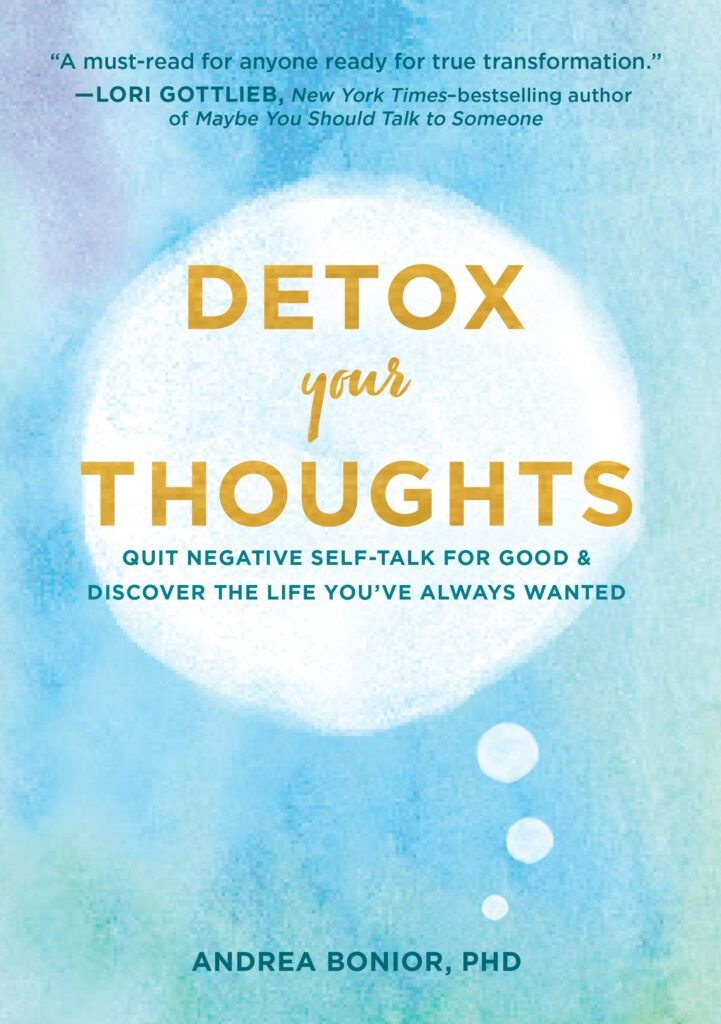
Psychologist Bonior (Psychology), who writes the Washington Post’s Baggage Check column, dazzles in this smart, practical guide to overcoming negative thoughts. The first step in changing internal dialogue, she claims, is to make thoughts less “sticky” by accepting that not every thought deserves equal weight. “Negative thoughts do not cause depression and anxiety disorders—it is when such thoughts become sticky that they can grow into depression and anxiety disorders,” she writes before offering a simple strategy for dispelling them: acknowledge the troubling thought, label it, remind oneself to give the thought space, ground oneself in the present moment, and visualise the thought passing.
She outlines how to see one’s blind spots and confront one’s discomfort, teaches readers to let go of intrusive negative thoughts, particularly ruminating on the past and thinking about how the world ought to be rather than how it is. Bonior writes in a sympathetic tone and encourages readers to celebrate even the smallest achievements in their quest for greater self-compassion. Any reader who is prone to self-doubt will find the outstanding blueprint for achieving lasting happiness in this witty, sage guide to be of assistance.
2. Essential Art Therapy Exercises by Leah Guzman
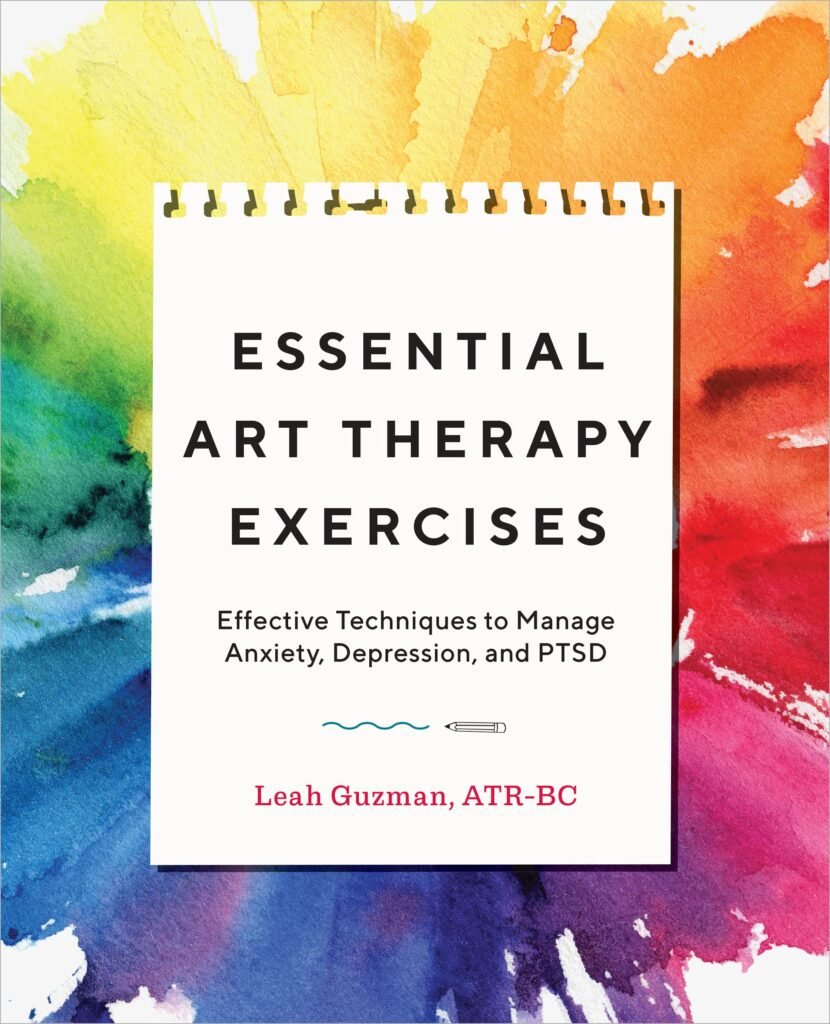
Essential Art Therapy Exercises demonstrates how art can alleviate depression, anxiety, post-traumatic stress disorder (PTSD), and other challenges in life. You will be able to gain emotional control and boost your self-esteem by participating in art therapy activities like drawing, painting, and sculpting.
These therapeutic activities—drawing a picture of your favorite song, writing affirmations, and taking photos to match—will assist you in overcoming the mindsets that are preventing you from moving forward and will lead you toward inner peace. All of them cover a wide range of artistic techniques and can be completed in as little as five minutes or as long as one hour.
Exercises in Essential Art Therapy include:
The art of getting better: These in-depth exercises serve as a foundation for self-awareness, self-expression, mindfulness, acceptance, and compassion for oneself.
Insights and questions: To help you get the most out of each experience, each activity provides a description of its advantages and thoughtful prompts.
You can use art therapy even if you don’t have any previous experience. It’s about having fun creating without worrying about being judged.
You can paint, draw, and write your way to a happier state of mind with the assistance of art therapy.
3. The Anxiety and Phobia Workbook by Edmund J. Bourne, Ph.D.

Anxiety, panic disorders, and phobias can make you feel like you don’t have control over your life. This go-to guide will help you deal with your fears and move forward. This evidence-based workbook contains the most recent clinical research and contains the most effective skills for assessing and treating anxiety. You’ll find a variety of tools for controlling your anxious thoughts, ending negative self-talk, and quieting worry:
- Unwinding and breathing procedures
- New examination on openness treatment for fears
- Way of life, exercise, care and sustenance tips
Composed by a main master in mental conduct treatment (CBT), this completely reconsidered and refreshed seventh version offers strong, bit by bit treatment techniques for alarm issues, agoraphobia, summed up tension turmoil (Stray), over the top urgent problem (OCD), post-horrendous pressure problem (PTSD), stress, and dread. You will likewise track down new data on backslide anticipation after effective treatment, and updates taking drugs, marijuana subsidiaries, ketamine, openness, nourishment, otherworldliness, the most recent examination in neurobiology, and that’s just the beginning.
This book offers the most up-to-date treatment options for overcoming the fears that prevent people with anxiety and phobias from living lives that are full of purpose and happiness—whether you suffer from these conditions yourself or work with professionals who treat them. You can use this workbook on its own or in conjunction with therapy.
4. Radical Compassion by Tara Brach, Ph.D.
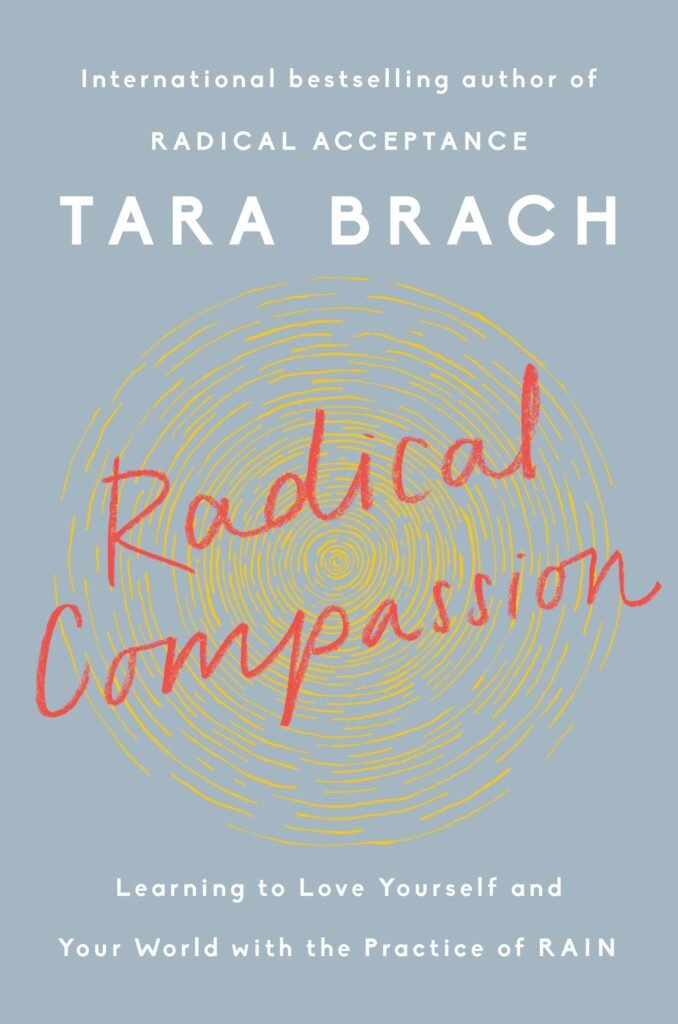
Tara Brach is a teacher in the field whose work addresses today’s ever-increasing barrage of news, conflict, demands, and anxieties. These stresses cut us off from the presence and creativity that give our lives meaning and leave us rushing around on autopilot.
She provides an antidote in this deeply personal and extremely useful book: a four-step, simple meditation that quickly releases difficult emotions and limiting thoughts. Memorable stories shared by Tara and her students as they deal with feelings of overwhelm, loss, and self-aversion, painful relationships, and past trauma, and as they discover step by step the sources of love, forgiveness, compassion, and deep wisdom that are alive in all of us, bring each step of the meditation practice—Recognize, Allow, Investigate, Nurture—to life.
5. Broken Open: How Difficult Times Can Help Us Grow by Elizabeth Lesser

This book will be republished in 2020 with an updated introduction to mental health and resources to help readers get through life’s challenges. Life offers us a choice during times of transition, stress at work, and even adversity that seems insurmountable: to either resist change or embrace it; to close down or to be opened up and changed.
In the New York Times blockbuster Torn Open, a flawlessly created mix of moving stories, silly experiences, down to earth direction, and individual journal, Elizabeth Lesser offers devices to assist us with settling on the decision we as a whole face in the midst of challenge: Will we be shattered and defeated, or will we be shattered and transformed? Lesser offers stories of normal individuals who have risen like a phoenix after disease, separate, cutback of an employment or a friend or family member – more grounded, smarter, and more in contact with their motivation and enthusiasm. Additionally, she relies on the world’s most renowned spiritual and psychological traditions to assist us in discovering our own unique identity.
6. Emotional First Aid by Guy Winch, Ph.D.
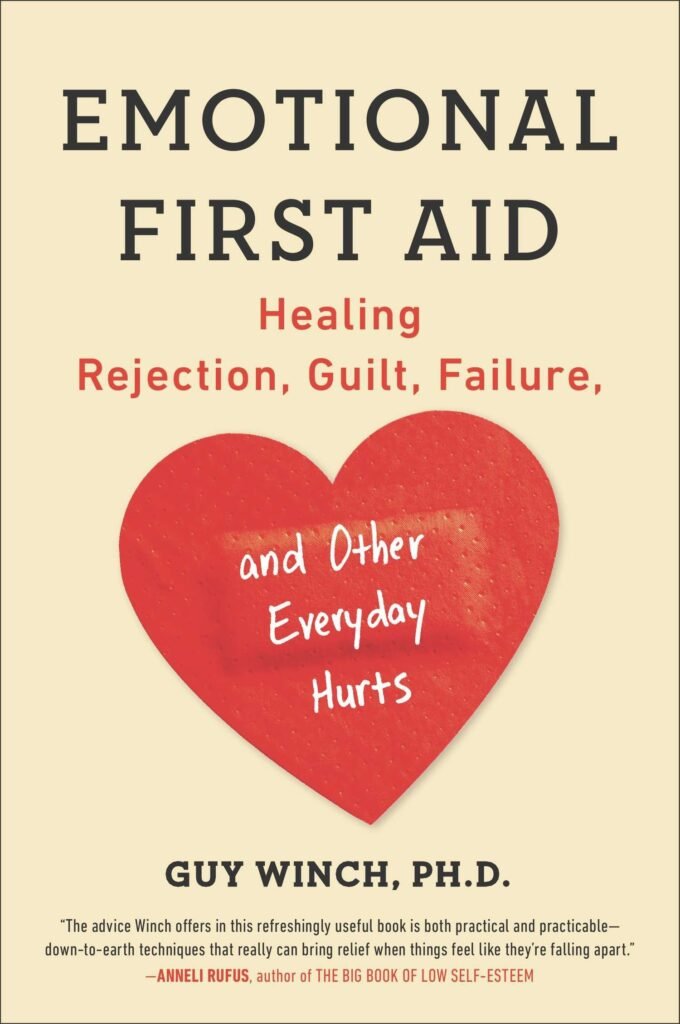
Do you recall the very first time you were turned down? It’s possible that you were not selected for a school team or invited to a party. Whatever your initial experience with rejection was, you won’t forget it.
Life is full of rejection. The kid who did not select you for her team either becomes a stranger who does not respond to your polite greeting or a business that will not employ you. However, despite its prevalence, rejection remains painful. Our self-esteem and sense of belonging are negatively impacted when we hear “No” or feel excluded. Additionally, minor rejections can lead to more serious psychological issues, just as a scratch can result in an infection if not treated.
The main point of this is: Reaffirm yourself to avoid serious harm from minor rejections.
Rejection can have a negative impact on your self-esteem. It is easy to fall into the trap of self-criticism and believe that you are somehow lacking when trying to comprehend why you were rejected. It is essential to boost your sense of self-worth and remind yourself of your own positive qualities in order to avoid this.
To begin, respond to any negative thoughts with arguments. Be sure your counterpoint is not only considerate but also pertinent to the circumstance. Therefore, tell yourself that the company just needed someone with a very specific background rather than thinking you screwed up a job interview.
7. When Things Fall Apart by Pema Chodron
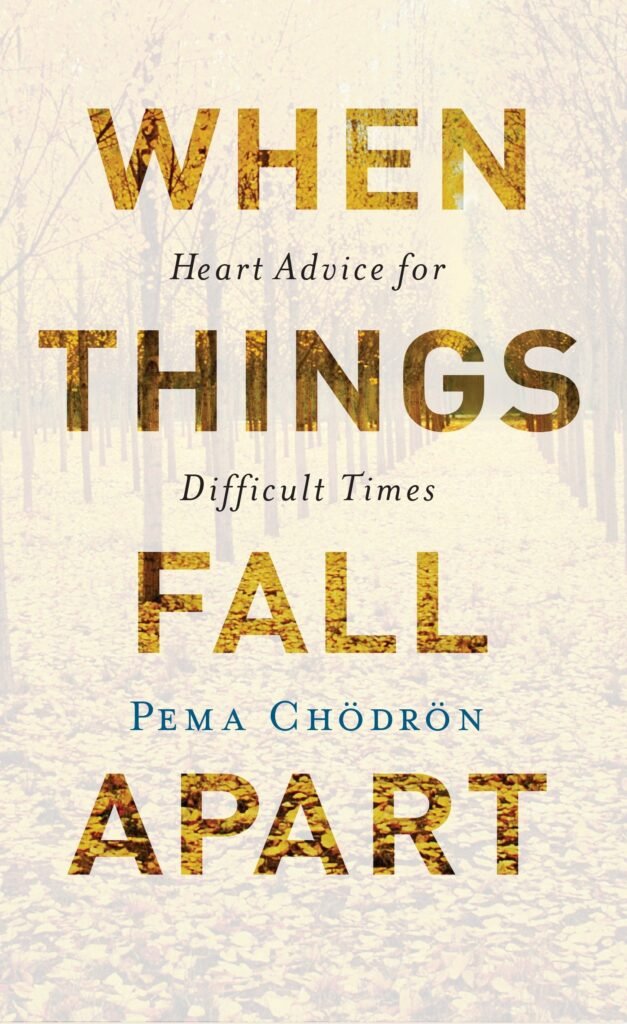
The majority of people will concur that we are caught up in trying times. We are now subservient to our ego. As we get older, our capacity for compassion dwindles as a result of our insatiable desire for more. GetNugget recommends the book by Pema Chödrön to its readers. Her past lends credibility to her claim that she can instruct us on how Buddhism, beyond the religious perspective, can deal with the severe wounds of modern life.
With its mindful advice on how to avoid despair, this mental health book reflects the core of Buddhist teaching. People must initially comprehend the true nature of meditation. Serene Sitting” isn’t a movement like some other; It is the only way to discover oneself. Chodron engages readers directly by providing them with strategies for overcoming modern traumas and agonizing experiences.
Anyone who stood next to her demonstrated how effective a real Buddhist life is. The sacred door to happiness is revealed through meditation, and it does not require discipline or order. Since it is not something that comes from outside, it is time to look within ourselves. Don’t be afraid to try the remedy in “When Things Fall Apart,” a life-altering book.
8. The Courage to Be Disliked by Ichiro Kishimi and Fumitake Koga
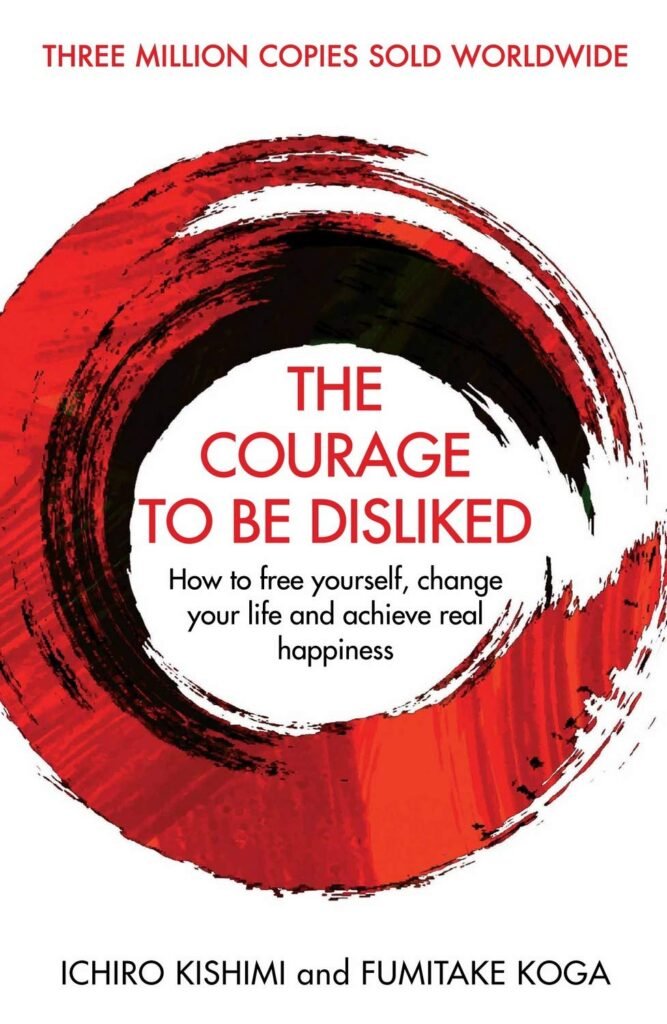
You end up with determinism if you believe that your present is determined by your past; Your past has already determined your future. In “Adlerian psychology,” we focus on our current objectives rather than causes from the past. Your present is determined by the meaning you assign to your past, not by your past.
Because you have chosen not to, you cannot alter the situation. You probably believe that keeping things as they are is simpler. You can react to events as they happen and guess what will happen if you stay this way. It’s similar to driving your old, familiar vehicle. You can easily maneuver despite the fact that it may shake a little. Yet, assuming you pick another way of life, nobody can anticipate what could befall your new self or know how to manage occasions as they emerge. Your life may be painful and fraught with anxiety as a result, and it will be difficult to see into the future. Therefore, you decide not to alter.
You are deciding not to achieve your goals. Because you want to keep the possibility of “I can do it if I can try” open, you don’t commit to anything. You don’t want your work to be criticized or rejected, and neither do you want to produce inferior work. The answer lies in courage to mental health.
9. Organize Your Mind, Organize Your Life by Paul Hammerness, M.D., and Margaret Moore

The way in to a less rushed, less upsetting life isn’t in basically coordinating your work area, however sorting out your brain. Dr. Paul Hammerness, a psychiatrist at Harvard Medical School, discusses the most recent neuroscience research on the mind’s remarkable built-in organization system. The science is translated into solutions by Margaret Moore, an executive wellness coach and codirector of the Institute of Coaching.
You will learn from this remarkable group how to make your life less stressful, more productive, and more fulfilling by utilizing the inherent organizational capacity of your brain. You’ll be able to:
– Take back control of your frenzy;
– Adopt efficient unitasking (since multitasking is ineffective);
– Fluidly switch between tasks;
– Make use of your imagination to make connections.
This ground-breaking guide is filled with stories of people who have learned to stop feeling powerless against multiplying distractions and start organizing their lives by organizing their minds.
10. Anxiety Relief for Teens by Regine Galanti, Ph.D.

You have a lot to do, and adding anxiety to the mix makes it harder to get good grades, keep up with social media, and keep friends. You might even be avoiding people, things, or events that could make you anxious. So, how can you ensure that you don’t miss out on life? In her book Anxiety Relief for Teens, Dr. Regine Galanti shows you how mindfulness practices and CBT-based skills can help you manage your anxiety and break bad habits. This helpful guide gives you the tools you need to deal with all of life’s challenges through simple and effective exercises that help you change your thoughts, actions, and physical reactions.
Features of Anxiety Relief and mental health for Teens:
- Quizzes and self-evaluations to learn more about your anxiety and emotions and the things that make them feel bad.
- More than 30 tools for managing your anxiety based on cognitive behavioral therapy, as well as practical methods for coping with difficult emotions like anger and sadness.
- Using visualizations, breathing, meditation, and other exercises, more than 30 mindfulness practices can help you deal with your anxiety in the here and now.
11. Learned Hopefulness by Dan Tomasulo, Ph.D.

It has been argued that pharmaceutical intervention and traditional psychology only partially address mental illness and emotional pain. Dan Tomasulo asserts, “They get us out of the hole, but they don’t really keep us out” (2020, p. 3). And the data support it: According to Tomasulo (2020), 80% of people who recover from therapy eventually require additional assistance.
Anyway, what might be said about the 20% who don’t backslide? They have acquired optimism. Tomasulo goes on to say that this hope “is not so much a state of mind as it is a habit of mind.” More importantly, like other routines and practices, we can learn and improve it. Wishful thinking is not the same as hope; (Luthans et al.,) Hope embodies agency and willpower. 2015). Even when a hopeful individual encounters difficulties, they actively devise alternate routes.
12. Notes to Self: A Journal for Self-Care by Lisa Currie

A journal for self-care that is the ultimate mental health care present. In these stressful and uncertain times, self-care has become a buzzword and a necessity.
Self-care can be anything you want it to be, as every page of this imaginative and insightful journal demonstrates. going on a nature walk. going to tea with a friend. writing a new bucket list or revising an old one. Lisa Currie, a best-selling illustrator and author, motivates and inspires us to devote some quality time to the most significant person in your life—yourself.
13. That little voice in your head by mo gawdat
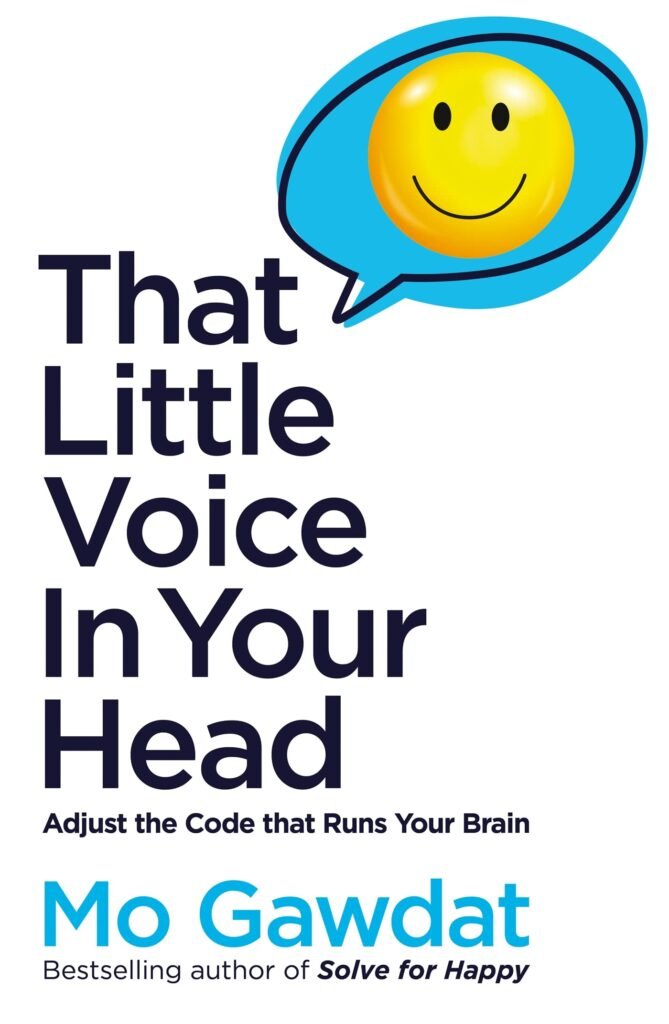
Mo Gawdat, author of Solve for Happy, is the author of That Little Voice in Your Head, a practical guide to retraining your brain for optimal joy. Mo demonstrates how, by combating negative self-talk, we can alter our thought processes, transforming our avarice into generosity, our apathy into compassion, and our willingness to invest in our own happiness.
Exercises to help readers reshape their mental processes are included in this book. Mo explains how mental health, despite their incredible complexity, our brains behave in largely predictable ways using his programming and neuroscience expertise. He creates this happiness user guide based on these insights.
Roused by the existence of his late child, Ali, Mo Gawdat has embarked on a mission to share a model for satisfaction in light of liberality and compassion towards ourselves as well as other people. Mo shares his “code” for reprogramming our brains and shifting away from the misconceptions that modern life presents us with, drawing on his experience as a former Google engineer and Chief Business Officer.
14. On agoraphobia by Graham Caveney

This book has frequently been referred to as an anti-meditation primer for mental health patient. It dispels common misconceptions about meditation and offers practical advice on how to make it work for you. Even if you’re skeptical, you’ve probably heard a million times that mindfulness and meditation are the best ways to improve mental health. Right now is the best time to give it a shot.
Although it is difficult to determine whether you are content, you can be. To do it, you don’t need a lot of money or expensive items. In addition to assisting you in stress management and performance enhancement, meditation is even more potent. In fact, it may ultimately make you happier. Many adults have the same feelings they did as teenagers. You want to find what satisfies you, and how your bliss can work on by adoring outsiders.

[…] 14 Mental Health Books for Anyone […]